A surreal journey through the life of the Author, this "Traumoir" is now available for free. If what you're reading inspires or moves you, please consider purchasing Toughen Up for $30.
Or purchase a subscription to Memoiry Lane with Stephen Kearin for access to all the author's work.
Resources & Hotlines
DIAL 988: Immediately talk or text to chat with a trained crisis counselor 24/7 for anyone who needs support for suicidal, mental health and/or substance use crisis or other kinds of emotional distress. People can also dial 988 if they are worried about a loved one who may need crisis support.
Veterans Crisis Support: Dial 988 then PRESS 1 or text 838255
National Domestic Violence Hotline 24hrs: 1.800.379.SAFE (7233)
National Suicide Hotline 24hrs: 1.800.273.8255
Alcohol & Drug Abuse Hotline: 1.800.454.8966
NAMA – National Alliance of Mental Illness: 1.800.950.6264
Adult Children of Alcoholics & Dysfunctional Families: www.adultchildren.org
Alcohol Anonymous www.aa.org
_______________________________________________________________________
The time had come for the family to stare straight down the barrel of a spine-chilling scenario…moving my father out of his home. After a good deal of research and some straight up threats, he agreed to move into an assisted living facility in Lancaster, California that was within a two-mile radius of my brother cousins and an In N’ Out Burger. My father was a man who didn't think he needed assistance with anything, let alone living, but I think he saw it as just a temporary setback, until he could claw his way back into the house and get that “God damned driver’s license back”…something he vowed he was going to “train for” after having failed his driver’s test, sticking the landing by re-entering the lot to the DMV at 75 miles an hour…among other things. He shared with us that what he hated most about his new living quarters, was that it was filled with old people. He spoke with open contempt about “Those biddies chirpin’ over near the elevator. “ There was a pool table upstairs that he only used once, he told us, to teach a blind woman how to play, but the old shark took pity on the other residents and stayed clear of it after that. “I don't want to take their money” he whispered. His mood darkened and hit a new low the day he turned to me on the way to the dentist and with the Irish pipes moanin’ low, sneered “Why are they pulling teeth out of the head of a dead man?”
His only true solace during that time was baseball, blessed baseball. Thank God for baseball, that’s all I can say, because my father lived for the game. The weeks that made up the offseason were considered The Dark Months in our family. Dad swore that when the Dodgers won the pennant in 59, traffic stopped on Ventura Boulevard, he got out of his car and hugged a stranger. My father thought nothing of bringing his 7-year-old son into a bar he frequented because it was owned by the Dodger pitching phenom Don Drysdale. I was warmly welcomed at Don Drysdale’s Dugout in Van Nuys, just around the corner from my elementary school and probably could have ordered a shot if I brought my glove and could have reached the bar. But I had long since left the Dodger Blue Church of my childhood and found God in the orange and black of “Your San Francisco Giants”…the sworn, blood enemies of my father’s team…a rivalry that began when both clubs were in New York and the legend goes that the hate ran so deep between the two, that when they played each other, workers had to nail the clubhouse door between them shut, so the players couldn’t get at each other. Dad was only able to grudgingly forgive me because at least The Giants were a National League team. My father refused to even acknowledge the American League, saying: “I’m not sure what they’re playing over there…but it isn’t baseball.” The same game he taught me as a little boy was the same game we shared when he was an old man. We would listen to Vin Scully and watch the Dodgers in his room and he would shake his head in wonder at least once a game and say, like he always did: “Just when you thought you’d seen it all.”
Most visits with my father ended with something like “I wake up in the night and I reach for her and she’s not there.” What was there was a stuffed version of the star of the television show, ALF, which Dad positioned thoughtfully on his pillow after completing military corners on his bed each morning. No one really knew why he held this program in such high regard or how this small, dragon-like plush toy had cast a spell over our father, but it was something about how real ALF seemed to him. He described the puppeteering as “powerful” and once said to me with full sincerity “It’s like that god damned thing was alive, Stephen.”
Within three months, they found a blockage in my father's intestines and had to perform emergency surgery. They thought the operation was successful, but while he was in the hospital, he developed pneumonia, and a blood infection. Our least favorite doctor was His Majesty, the lead surgeon and his royal court, who once responded to my sister’s question about my father’s condition by asking her if she was a doctor, which led us to question whether he was a human being. Our favorite doctor however was Dad’s 9-foot-tall Scottish pulmonologist, who I would lovingly impersonate by standing at the end of my father’s bed and proclaim: “Mr. Kaaren…yer loongs err fell of myoocus” which would cause Dad to laugh and cough up more “myoocus.” In most cases, when any doctor left the room, Dad would usually shake his head and mutter “That was a five-dollar speech.”
As he got sicker, our father started to talk about the wars and combat and death.
He described a sky filled with enemy fire and how it felt to hang helplessly under a parachute, hearing the sounds of other soldiers dying in their harnesses.
He talked about jumping in an ice storm and landing on frozen snow that was harder than concrete. He described his commanding officer taking a direct hit from a mortar shell and disappearing right before his eyes.
“He's gone. He's gone. He's gone, he's gone” he said one day, sitting up and pointing in all directions. “Why am I still here?” I channeled the wisdom of the ages, as I answered him: “I don’t know.”
After he contracted the blood infection, it required all of us to wear paper jumpsuits, hats, booties and masks. Dad was struggling with a fever one day and was drifting in and out a bit. In his delirium, and with only my eyes showing, he mistook me for the barber back on the army base in World War 2. He told me to cut his hair before he headed over to the mess hall and then leaned in and said: “Let me tell you about my son” and proceeded to lovingly tell me about me. This went on for a few minutes until the fever passed and with it, all memory of my father telling me to my face what he could never tell me to my face.
One morning, as we were touching upon some light, Irish Catholic fare, like the divorce, and Hell, because that's exactly where Dad thought he was going because of the divorce, I threw a Hail Mary and asked him if he believed in Heaven. He took a long time to answer me, but he finally said, “I don't know, but I guess being born is a miracle in itself.” My father didn't say things like that. My father didn't talk like that. My father said things like, in reference to my marriage, after my wife left the room the night prior and he pinned my arm to the blankets, quote: “Don't fuck that up.”
The following day, he looked up at me from the hospital bed, shrugged and said: “Well, I guess something's gotta get ya” and then he worked his hand out from under the blankets, and shook my hand. “How are you?” he asked me. “How are you, today?” How am I, today? Later, I watched him ask other people the same question.
After my father died, I stood over his body and looked at the scar on his chin that he always referred to as The Night I Quit Drinkin’. I remember looking down and noticing his drawing hand, so still now, just resting on the blanket. Good job, Eugene.
Two wars, one divorce, no therapy.
I guess this would have been the time to salute him, but I knew that wasn’t allowed, not by me…not even close.
He’s been dead for over ten years now and we’re still not sure he’s retired. We always half expect to find a bleached claw clutching blueprints at the base of the headstone.
His last service position in WWII was that of a military escort. He escorted the bodies of 47 soldiers back home out of the hub in Chicago. 47. The exact same number of jumps he made out of an airplane too, he told me once.
Because of his escort experience, my mother once said, “Your father and I don't see eye to eye on too many things, but when someone dies, there's only one guy to call,” and now it felt like there was no one to call.
Years prior, when the advice columnist, Dear Abby died, I remember Dad putting the obituary page down on his knee, raising his head and saying: “Well…it looks like we're on our own now,” and I knew what he meant. When both your parents are gone, there's a distinct feeling of being marooned.
But every time I see a priest kidnapping a family, or a nun headed straight to Hell, every time I see a small boy being lowered into a hole with his little arms full of dynamite or the parachutes filling the skies over France, every time I witness the artistry of skate dancing or the mystery of night vacuuming or the majesty of comic diving, every time I think I’m having a myocardial infarction or my loongs err fell of myoocus, or I see someone dead at their drawing table, or hit by a fuckin’ truck, every time I see some dish towels at the supermarket, just sitting there with no one around, or The Shroud Of Turin or I pass the stadium light stanchions of Mission Viejo High School, every time I sit with my palms facing upwards toward the sky and am reminded that being born is a miracle in itself…I may still feel marooned, but I could swear I can almost make them out, just off shore.
Neither of my parents were angels…I like to think they showed more range. Whenever my father said, “With all we’ve been through as a family, I can't believe how great you kids came out.”…Lisa, Sheila and I always whispered the same punchline.


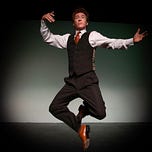



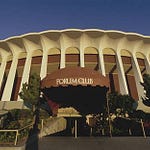

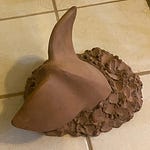
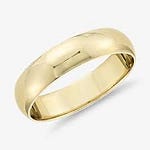
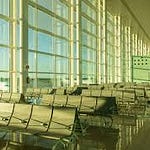

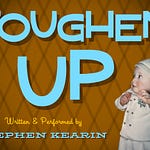
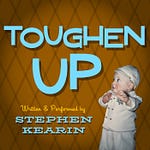
Share this post